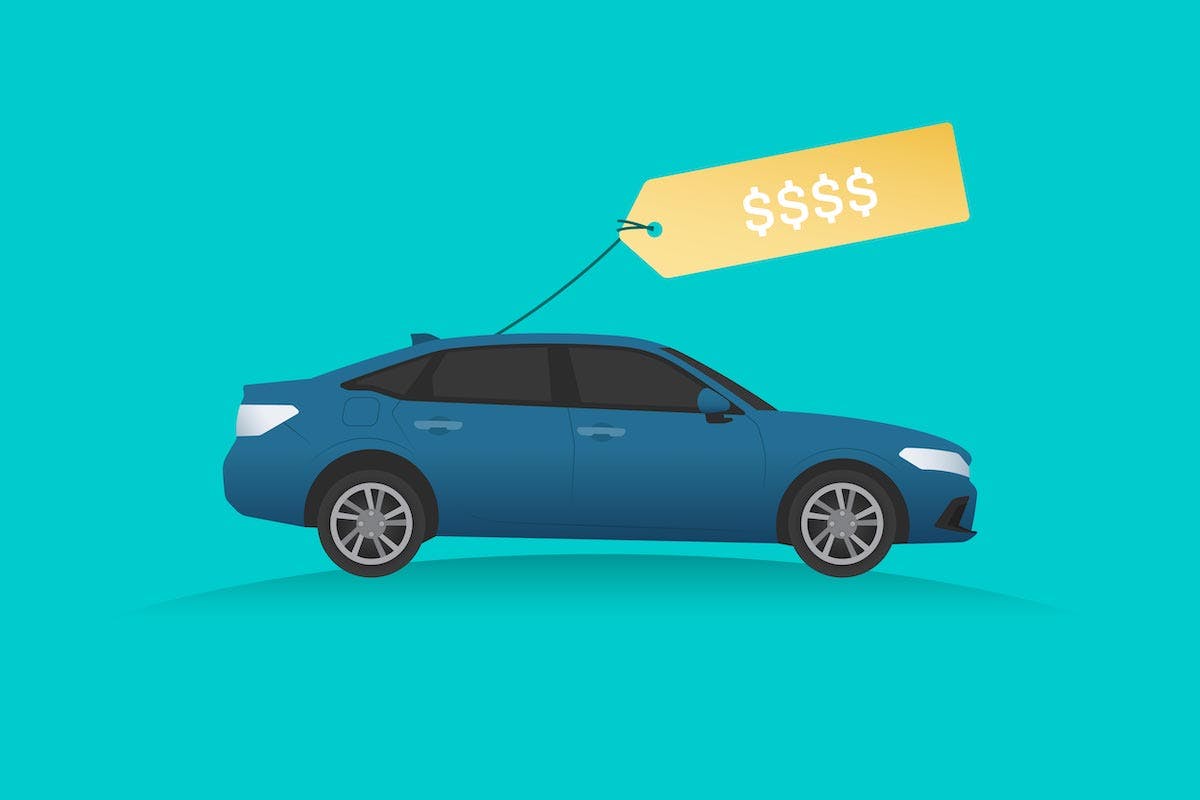How much does owning a vehicle in Montreal cost in 2024? 68% more than in 2019
By Maude Gauthier | Published on 21 Feb 2024

Cars cannot escape inflation. On the contrary, they contribute to it! In 2024, the average cost of owning a vehicle in Quebec is $1,302 per month, compared to $773 per month in 2019. If you buy your car this year and keep it 7 years, you will spend a total of $112,284 taking into account an annual inflation rate of 2%. To dissect the costs of owning a car, we precisely calculated the inflation of its main expenses. Our analysis ranges from 2019 to 2024 and is based on gas-powered cars, which still far outstrip electric cars in terms of sales (4 cars out of 5 use gas). Keep reading to find out more!
Acquisition cost and depreciation: Your car loses value quickly
According to AutoTrader data, the average price of a new vehicle in Quebec increased from $34,104 in 2019 to $66,288 in 2023. Why? In addition to supply issues and labor shortage, there are fewer entry-level models on the market (goodbye, little Rio! goodbye, dear Fiesta!). Even if some people criticize the change towards bigger cars, consumers want SUVs, for instance, contributing to inflated sales prices.
To estimate the average purchase price in 2024, we took into account inflation forecasts of 3.11% and a general stabilization of automobile prices. The calculation brings the total to $68,350 in 2024.
In addition to being very expensive, new cars always suffer a certain amount of depreciation, i.e. they lose value as soon as they leave the dealership. We compared 2024 models selling for around $68,000 with their equivalents from earlier years. They show a loss of around 69% over seven years. In 2024, out of a total monthly cost of $1,302, $561 (43%) is attributable to the vehicle’s acquisition cost and depreciation.
But how much will a Jeep Wrangler, Kia Forte or Audi Q5 really cost you in 2024? You have to take into account financing (car loan), gasoline, maintenance, insurance, registration and parking, among other things. Some of these costs have increased drastically, such as insurance and interest, while others less so.
Financing: More expensive than before
Interest rates on financed vehicles have increased in recent years. In 2024, 15% of the costs of owning a vehicle (or $194 per month) goes towards paying interest on loans, whereas in 2019, we were talking about less than 6%.
Most consumers choose a loan of 7 years or more. We calculated the interest on the loan using our car loan calculator. In fact, you pay a lot more interest at the beginning and less, if any, towards the end.
According to data collected by the Canadian Automobile Dealers Association, interest rates on automobile loans were just over 3% in 2019 and rose to 5.5% in 2022. We have chosen a rate of 7% for 2023 and 6.29% for 2024. To estimate them, we analyzed the rates offered by car manufacturers on their websites (Honda, Ford, Hyundai, Mazda) and predicted a slight drop in 2024, since experts believe in a reduction in the prime rate, which will influence car loans.
Gas is still expensive
According to the Consumer Price Index, some spending categories have experienced notable variations recently. This is the case, for example, for fuel, which decreased in 2020 and then increased by 36.6% in 2021, followed by more modest increases in 2022 and 2023. A 7% drop in the cost of fuel is expected in 2024.
The cost of gasoline was calculated based on the average annual price (in cents per liter) for a vehicle consuming 9.4 L per 100 km and traveling 16,000 km per year. A consumption of 9.4 L is fairly standard, but you can find cars consuming 6 L per 100 km or more than 12 L on the market. We have retained 16,000 km per year since this is the average for Quebec drivers.
While the average vehicle cost you barely $154 per month in gas to travel 16,000 kilometers per year in 2019, you would have to pay $204 per month in 2023. For 2024, this cost could drop to $190.
The increase of car insurance rates
In Quebec, the average cost of car insurance was $775 in 2021, and taking into account inflation, it will reach $904 in 2024. This average includes both new and expensive vehicles as well as older vehicles which have a lower value and require fewer protections. Your new car will probably cost you more than $904 per year in insurance! When it is older, your premium should decrease.
After an increase of almost 8.2% in 2023, car insurance premiums are expected to rise by another 10% this year in Quebec and even more in other provinces. Ouch! Among the explanatory factors, we find the car theft crisis and costly repairs of models with advanced technologies. The Jeep Wrangler, for example, which retails at a base price similar to the average price, costs more to insure than the average vehicle. This is one of the most stolen models in Canada! I requested a quote for this type of vehicle and it would cost me $1,535 plus taxes per year.
To save money, use a car insurance comparison tool. If possible, run several simulations to help you choose between two car models that interest you; one may cost a lot less in insurance.
Maintenance and repairs
The maintenance and repairs of a vehicle vary over its life. We spread the cost of new summer and winter tires (every three years), three oil changes per year ($50 each), new brakes and minor breaks like spark plugs and windshield wipers over the total ownership period. Four tires can cost between $400 and $1,000, so there is some variation to expect depending on your car, wheel size, and quality preferences. The same goes for parts like brakes, the price of which varies depending on the brand. Changing four brakes every four years easily costs more than $1,000. More significant repairs will be added as the vehicle ages (related to the engine and electronics).
In reality, the cost is much lower the first years ($500 or less) and it increases depending on the age of the vehicle. To estimate maintenance costs in 2024, we simply used the expected inflation rate of 3.11%. This industry is still experiencing labor shortages, so we are not immune to steeper increases. Thus, over 5 years, costs increase from an average of $1,200 to $1,500 per year.
Parking (and fines!)
In 2023, the CRE-Montreal environmental group estimated the value of an on-street parking space in the city at $1,275, taking into account construction costs and land value. Considering expected inflation, we calculate this value at $1,315 in 2024. Five years ago, it would have been $1,130, with inflation varying from -1.2% to 8.1% between 2019 and 2023 .
In 2024, expect to also pay around $189 in fines per year (or $16 per month), or around 2 parking tickets. We all try to respect the signs, but it is quite easy to make a mistake! The calculation takes into account the City of Montreal’s revenue for fines and penalties, divided by the number of cars in circulation. Rest assured, this expense only takes up 1% of the annual cost of owning a car.
Increases in fines tend to come in spurts. If we go back a little further in time, we see in this table significant increases in 2017, 2018 and 2023, for a total inflation of 68% for parking prohibited in 7 years. It is even worse for parking in reserved lanes, where the increase reaches 134%.
| No parking | Reserved lane | |
| 2017 | $53 | $149 |
| 2018 | $62 | $150 |
| 2019 | $78 | $302 |
| 2020 | $79 | $307 |
| 2023 | $89 | $348 |
Alternatives to driving in Montreal
According to the STM fare schedule, an adult pays $97 per month for their metro and bus pass. So, a Montrealer who wants to save as much as possible on transportation can settle for it, for the modest sum of $1,164 per year.
Since public transportation is limited when you want to leave the city or transport large objects, let’s take the example of a Montrealer who subscribes to Communauto for $40 per year (Economic plan). He uses it three times a week, for 2 hours for shopping about 6.5 km from home. He also does a day trip 100 km out of town.
Using Communauto then costs him $244 per month. He also has his monthly STM card ($97). Since he travels 692 km per month, the cost is $0.49 per kilometer, which represents half the cost per km of owning a vehicle.
Someone who doesn’t want to bother with a subscription or spend time finding vehicle stations might prefer Uber. However, this mode of travel is quite expensive for a comparable number of kilometers. Let’s say a Montrealer makes two round trips per week with Uber for an average trip of 10 km. He then travels 160 km per month for $383. Including his monthly STM subscription, his trips total 496 km per month. The two together cost $480 per month, which is barely more economical than owning a car.
Infographic: The Cost of Car Ownership in Montreal in 2024

